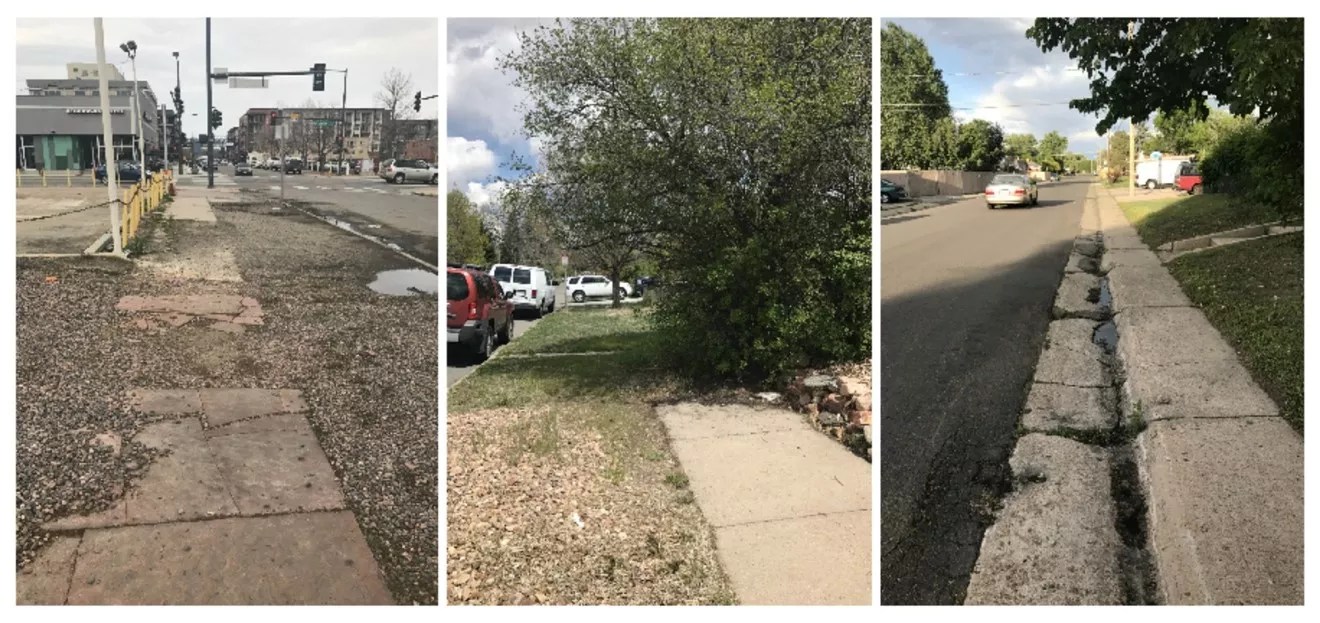

Audio By Carbonatix
Jill Locantore, executive director of Denver Streets Partnership, estimated last September that it would cost $1.1 billion to complete Denver’s sidewalk network, “but the previous year’s expenditure was around $2 to $3 million. At that level, it would take more than 400 years to finish. And who knows if the Earth is even going to exist in 400 years?”
Cut to this week, when the Denver Elections Division officially gave its blessing to Denver Deserves Sidewalks, a proposal that will now be on the November ballot. It calls for publicly funding sidewalk construction and repair, and Locantore says that its passage would dramatically speed up the timeline for addressing the issues.
“This would allow the complete sidewalks network to be built out within nine years,” she notes, 391 years ahead of schedule. “So it might actually happen in our lifetime! That would be so exciting.”
The need is great, she adds: “Right now, 40 percent of Denver’s streets either don’t have a sidewalk at all or the sidewalk is too skinny to accommodate a person in a wheelchair or a parent with a stroller or two people who want to walk side by side. And beyond that 40 percent, there are an unknown number of sidewalks that are in serious disrepair, and that absolutely contributes to safety problems.”
Trends related to traffic fatalities “are definitely going in the wrong direction. Last year, we hit a new high-water mark, with 84 people killed in preventable crashes, and we’re on pace to meet or exceed that this year,” she says, despite city mitigation efforts such as Vision Zero, a five-year action plan with the mission of eliminating traffic deaths and serious injuries by making roadways safer for everyone as of 2030. “People walking are thirty times more likely to die in a traffic crash than people in a car, and sidewalks are clearly a contributing factor,” she adds.
Currently, sidewalk repairs must be paid for by the property owner, “and that can cost thousands of dollars and be a real headache,” Locantore notes. But Denver Deserves Sidewalks “would place the responsibility for repairs on the city, just like the city is responsible for the streets and storm sewers. This funded source would allow the buildout of the sidewalk network in nine years, and it would also be a sustained funding source in perpetuity, so we can maintain it in good condition.”
The money would come from what Locantore describes as “a modest property fee that would be paid by every property owner in Denver, which is a much more equitable way to spread the cost over the entire city. It’s modeled on the stormwater fee that property owners pay and is based on the linear frontage of the property – how wide the property is and the type of street the property is located on.”
Blueprint Denver, the city’s land-use and transportation plan, which was adopted in 2002 and updated in 2019, includes guidelines for thirteen types of streets and the preferred sidewalk size for each. Generally, Locantore says, the recommendations call for “sidewalks on local, residential streets to be six feet wide; bigger, commercial streets to be eight feet wide; and downtown streets to be twelve feet wide.”
The fees, as explained on this Denver Streets Partnership fact sheet, would reflect the variables: $2.15 per linear foot of property frontage for most residential areas, $2.87 for parkways, $3.58 for mixed-use and other buildings on arterials, and $4.30 for downtown. Locantore calculates that the owner of a typical single-family home on a local street with a fifty-foot property frontage would pay $107.50 annually, or around $9 per month.
Given the impact of inflation and the current state of the economy, convincing Denver voters to dig deeper for sidewalks could be a challenge, even if the fees are essentially an insurance policy against the huge expense of replacing sidewalks under the present system. To spread the message, Locantore says that supporters will supplement what she refers to as “all the usual tools” (yard signs, online media, mailers and so on) with education efforts “to help people understand what the current policies are. A lot of people don’t realize it’s their responsibility to fix the sidewalk in front of their house, why there are so many terrible sidewalks, and how this will increase safety and make Denver more accessible for everyone, including people with disabilities. And it will also improve our air quality, help us work toward climate-change goals, allow kids to get to schools more safely. There are so many benefits.”
As a result, Locantore emphasizes that “we’re feeling really optimistic. We collected more than 19,000 signatures in order to qualify for the ballot” – the 10,000-plus that were certified easily exceeded the minimum threshold – “and we’ve had so many good conversations with community members who are not only supportive of the idea, but enthusiastic about the idea that we could finally get good sidewalks in our city.”
And we may not have to wait four centuries to get them. For more information, visit denversidewalks.com.